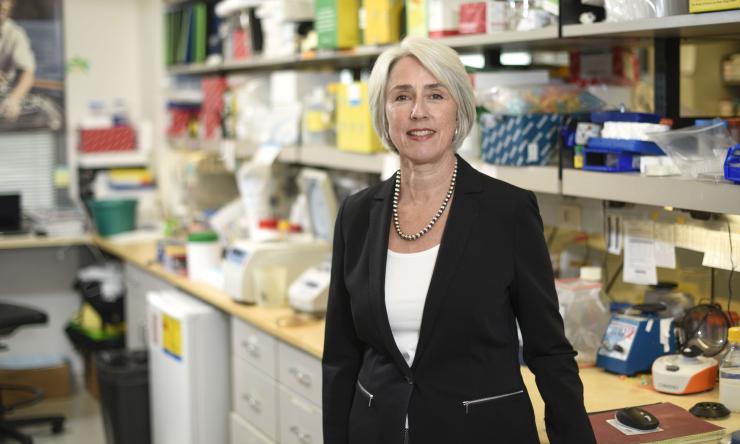Dr. Margaret Goodell named to the National Academy of Sciences
Dr. Margaret (“Peggy”) Goodell, an expert in the field of stem cell research, has been elected as one of the newest members of the National Academy of Sciences. She is being recognized for her distinguished career and continuing achievements in original science and research.
“I feel so very fortunate. It is a huge honor to be recognized this way. My scientific achievements have been made possible by the exceptional environment here at BCM, including wonderful trainees, colleagues and leaders, all of whom I am very grateful to,” said Goodell, who is professor and chair of the Department of Molecular and Cellular Biology and holds the Vivian L. Smith Chair in Regenerative Medicine at Baylor College of Medicine.
Goodell also is the current and founding director of the Stem Cells and Regenerative Medicine Center (STaR) and a leader in the Dan L Duncan Comprehensive Cancer Center where she serves as both the associate director for basic science and co-leader of the cancer cell and gene therapy program.
She is among 120 new members, including 30 international members, from a wide range of disciplines and professions.
“Peggy Goodell is a great leader, wonderful mentor and a top scientist in the field of stem cell research,” said Dr. Paul Klotman, president, CEO and executive dean of Baylor. “The National Academy of Science membership is a tribute to her work in advancing an important field and having a significant impact on training the scientists of the future.”
“Fabulous! This is a terrific and well-deserved honor for Dr. Goodell. She is an excellent, talented leader,” said Dr. Carolyn Smith, dean of research at Baylor.
Goodell attended the Imperial College in the United Kingdom, earning her Bachelor of Sciences degree before completing her Ph.D. at the University of Cambridge. She completed her postdoctoral fellowships at the Whitehead Institute for Biomedical Research and Harvard Medical School. In 1997, she joined the faculty of Baylor College of Medicine as an assistant professor in the Departments of Pediatrics, Molecular and Human Genetics, and Immunology.
Her work has significant impact for regenerative medicine, leukemia research and aging. Her lab explores the regulation of hematopoietic stem cells (HSCs), which are stem cells found in all adults that are responsible for blood formation and regeneration. Goodell studies how dysregulation of these stem cells contributes to aging and blood cancers such as leukemia.
One of Goodell’s early contributions was her development of a novel technique to isolate stem cells from tissues in adult animals. This strategy was applied to blood as well as and other types of stem cells, paving the way to study them in depth. This allowed Goodells lab, and many others, to discover how they were regulated in normal and aberrant contexts, such as during an infection, or in early stages of cancer.
Goodell is the sixth current member of the Baylor College of Medicine faculty named to the National Academy of Sciences. She joins Dr. Hugo Bellen, Distinguished Service Professor of molecular and human genetics; Dr. Mary Estes, Distinguished Service Professor of molecular virology and microbiology and Cullen Foundation Endowed Chair; Dr. Martin M. Matzuk, interim chair of pathology and immunology, director of the Center for Drug Discovery and Stuart A. Wallace Chair, Robert L. Moody, Sr. Chair; Dr. Bert O’Malley, chancellor of Baylor College of Medicine; and Dr. Huda Zoghbi, professor of pediatrics, molecular and human genetics, neurology and neuroscience and Howard Hughes Medical Institute Investigator.
The National Academy of Sciences is a private, non-profit society of distinguished scholars that was established by an Act of Congress and signed by President Abraham Lincoln in 1863. Scientists are elected by their peers to membership for outstanding contributions to research and it is a lifetime honor.
Goodell also was recently honored as a new member of the American Academy of Arts and Sciences. It is one of the country’s oldest societies and independent policy research centers. It recognizes exceptional scholars, leaders, artists and innovators and engages them in sharing knowledge and addressing challenges facing society.










